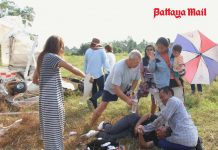Editor;
A Chinese proverb suggests: “The wise adapt themselves to circumstances, as water moulds itself to the pitcher.” A refreshing Sign of Life, pure thirst-quenching water is clear, colorless, tasteless, formless, shapeless and free-flowing. Nothing is more flexible and yielding than the Water Cycle. The main lesson to be learned from the debilitating flood crisis is the urgent need for everyone in Thailand to voluntarily join positive energy forces to work together for the common good and to help enable those most in need, providing supportive emergency resources for the proud, disheartened but resilient flood victims to help themselves and to regain some semblance of routine survivalist coping in their unsettled lives.
Local administrative bodies should be given increased autonomy and authority to determine what works best for and within their village communities. The National Reform Committee has called for decentralised, cooperative local decision-making regarding economic, social, political and security matters. Truly representative democratically elected leaders should also be primarily responsible for prioritizing and running their own affairs, including overseeing local police, operating community schools and managing natural resources in their rural areas. There is an urgent need for a system-wide overhaul, especially in the aloof, Bangkok-centric Interior and Education ministries, in order to increase community-based autonomy and relegate out-of-touch, imposed work responsibilities. The aim should be to promote people’s independence, yielding to those most involved in day-to-day decision-making and problem-solving of relevant issues.
Community schools foster effective, strong partnerships, sharing accountability for mutually agreed-upon results, serving as human-service magnets to look after and care for the welfare of rural villagers related to physical, mental, spiritual, emotional and behavioural health issues, family support, youth activities and community development projects. They aim to help promote a social climate that is secure and supportively respectful, where there is mutual, effective collaboration among parents, families and school staff to motivate and engage civic-minded learners, instilling self-confident dignity. Budget-allocation priorities should balance longstanding inequities where those with the greatest needs receive the least help. “What’s in it for me?” mindsets should yield to “What’s best for the common good?” A leaner, cleaner, keener MOE should transfer redundant, inactive positions back into the classroom, changing from top-downslide authoritarianism to encourage bottoms-up, what-matters-most self-determination instead. The prerequisite is relinquishing vested interest, favoured control and connections-based nepotism through increased community-based autonomy.
A Kenyan proverb states: “Treat the Earth well. It was not given to you by your parents; it was loaned to you by your children.” Critical, intensive care attention must also be paid to the extensive and profound interaction between humankind and nature to effectively plan immediate reconstruction steps to deal with issues related to climate change and to create an Action Plan and Timeline to cooperatively develop long-range infrastructure strategies.
Chanchai Prasertson
Bangkok




